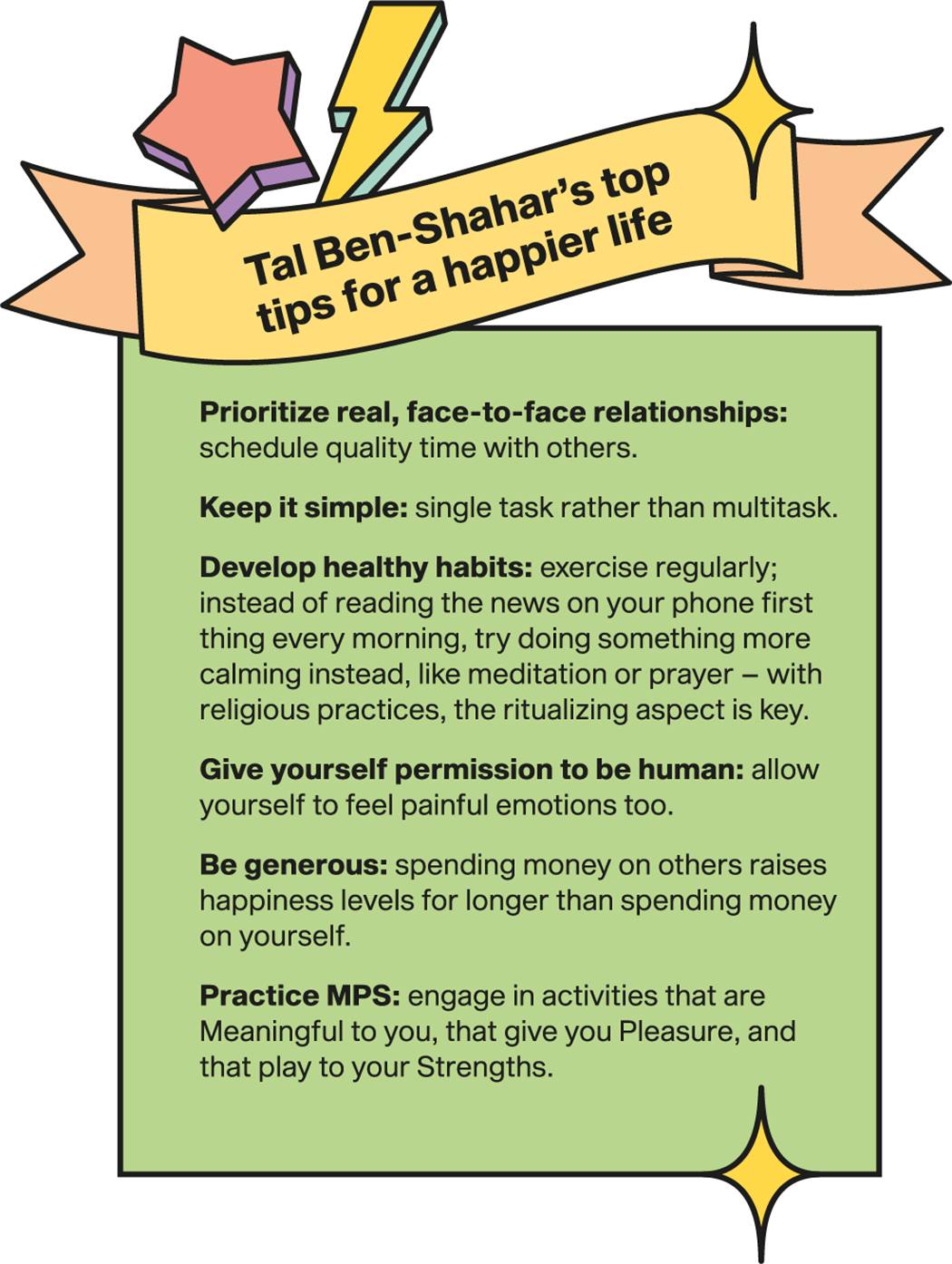
IESE Insight
A realist's guide to happiness
Forget what you know about happiness. To become more positive, embrace the negative. This and other practical tips from positive psychologist Tal Ben-Shahar.
Are you happy? What does "being happy" even mean? For many, it's "having made it," to have achieved that better job, promotion, raise or some other marker of "success." If happiness is measured in purely financial or material terms, it's no surprise, then, that OECD countries with high GDPs filled the upper ranks of the United Nations' 2019 World Happiness Report. European, particularly Scandinavian, countries dominated the top 10, along with Canada and New Zealand. The United Kingdom came 15th and the United States 19th out of 156 countries ranked by how happy their citizens perceived themselves to be.
Yet, when examining on a country level whether happiness had increased or decreased between 2005 and 2018, Western Europe, North America and Australasia were net losers and, overall, negative emotions were on the rise. And China, with its growing middle class and rising car ownership, came in at 93, lower than war-torn Libya or crisis-struck Greece.
The reasons for this are complex and include external pressures such as the global economic crisis of the past decade, growing inequality and workplace precariousness, along with environmental factors such as air pollution. But they also reflect the increased stressors of modern life, particularly the "always on" culture promoted by constant digital connectedness, which leaves many professionals constantly working or entertaining themselves online when they aren't. The World Health Organization has declared a "pandemic of stress," causing loss of productivity, absenteeism and health crises. And that's even before the latest coronavirus pandemic.
Amid chronic levels of everything from stress and burnout to sick leave and turnover, it's clear that our understanding of "having made it" needs an overhaul. But what can we do to boost our levels of happiness — or well-being, to put it in more scientific terms?
It starts by recognizing that neither money nor success are, in themselves, predictors of greater happiness. The more we make the bigger house or bigger bank account the end point of all our searching, the more this can lead to feelings of disillusionment or depression — what's known as the "arrival fallacy."
To really be happy, we may need to throw out much of what we think we know about happiness and start from the ground up. Though it may seem counterintuitive, we may need to embrace unhappiness in order to finally be happy.
Let yourself be human
"Imagine refusing to accept the law of gravity," says Tal Ben-Shahar, an Israeli-American author and lecturer who teaches worldwide on happiness, self-esteem, resilience and mindfulness, including courses on "Positive Psychology" and "The Psychology of Leadership" at Harvard University. "It would be unthinkable not to accept gravity." Yet when it comes to painful emotions, our approach is rather different. "We ignore the fact that painful emotions are as much a part of human nature as the law of gravity is part of physical nature."
Emotions that are smothered are likely to build up, he warns. To make his point, he commands you not to think of a pink elephant. What's the first thing that springs to mind? A pink elephant. Negative emotions are the same, he says. By denying our anger (an emotion commonly bottled up by women), fear (ditto for men), envy and frustration, we don't eliminate them — we cause them to intensify.
These negative emotions can manifest themselves physically — through backache, for example. They may cause us to explode or hide from our responsibilities. Ultimately, they will make us unhappier than if we had just let ourselves experience them.
Allow time for recovery
In addressing the ills of the modern workplace, we frequently target stress, "the silent killer." But Ben-Shahar feels our blame may be misplaced. "The problem is not stress per se," he insists. "The problem is not allowing time for recovery." After all, when we go to the gym and work out, we're subjecting our muscles to stress, but we do it to make ourselves stronger. The hurt comes when we do set after set, without letting ourselves rest and recover from the last workout. The same can be applied to our emotional well-being: "We need to energize our lives with recovery."
Ben-Shahar suggests some practical ways of building recovery periods into our lives. On the simplest level, schedule regular breaks into your workday. From pausing to look out of the window to making sure you eat a proper lunch away from your desk, these are attainable goals that most of us can fit into our workday.
When we can, we should leave work behind properly. The reparative value of a good night's sleep or a day off cannot be overstated. With more than half of Americans not taking all the vacation days they're entitled to, and with people worldwide failing to disconnect from email during weekends and holidays, it's no wonder that happiness levels have taken a hit.
Both companies and individuals need to recalibrate the way they think about time off. IESE professor Mireia Las Heras has discovered that the culture of a company changes, and workers are better off, when managers model best practices. When the boss is working weekends and sending emails at midnight, staff feel the pressure to be likewise connected. However, when managers take a day off to take a parent to the doctor or attend a child's school play, staff are empowered to focus on their own work-life balance, resulting in higher personal happiness and workplace gains in terms of more productivity, creativity, motivation, teamwork and engagement.
Spend time with others
Psychologists agree that strong interpersonal relationships are the No. 1 predictor of happiness, as well as of health and longevity.
Ben-Shahar cites research in Latin America, a region with high inequality but also high happiness ratings. It turns out that the older generations, with their strong family ties and social focus, are tipping the balance there. They are also likely to have spirituality in their lives — another predictor of happiness. Meanwhile, the younger generations, whose relationships are often digital, are no happier than their peers elsewhere.
In Denmark (ranked 2nd for happiness in the 2019 World Happiness Report), its cultural concept of hygge prioritizes just spending time with family and friends, playing board games or having a meal, in the coziness of your home. This "intentional social intimacy" may hold further keys to well-being. Interacting and being in relationship with other people are what counts, more than the specific reason for those relationships.
The main thing to remember is that "happiness is not a goal," says Ben-Shahar, "it's a continuum." He says he's happier now than he was 25 years ago when he began studying the science of happiness, but that he hopes to be happier still in 10 more years. Research is on his side here. A study from the U.S. National Bureau of Economic Research looked at data from 132 countries and concluded that happiness dips in middle age and then recovers, with 47 being the "unhappiest age."
So, the good news is, any misery you might be feeling today has its peak. And the sooner you stop chasing after false notions of what will make you happy, and start putting these small yet enormously effective actions into practice, the closer you'll be to truly "having it all."

A version of this article is published in IESE Business School Insight magazine #155.
Tal Ben-Shahar spoke at IESE's Global Alumni Reunion in Barcelona. He is co-founder of the Happiness Studies Academy, Potentialife and Happier.TV.
